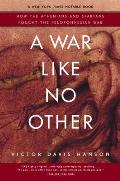 by Victor Davis Hanson
by Victor Davis Hanson
Why do we still care about the Peloponnesian War, 2500 years after it ended? Because it became the prototype war for death struggles between ideologies. With the possible exception of the Punic Wars, the Roman wars of conquest were primarily political and personal matters, only incidentally spreading the idea of Roman Law. By the time of the Empire, the Romans were more civilized, but hardly more idealistic than their enemies.
It’s also the best-documented ancient war. Along with Thucidydes’s and Xenophon’s contemporaneous accounts, the 4th-Century Athenians never stopped writing about its effects on their society and culture. Numerous classical historians have written accounts of the war, as well. After Troy and the Persian Wars, the Peloponnesian War was the beginning of western classical education (which meant basic education until Dewey).
So what need of A War Like No Other, especially on the heels of Donald Kagan’s seminal four-volume history, and it’s one-volume condensation meant for the likes of me?
Victor Davis Hanson offers a different way of telling the same story, describing not who fought where and when, but how they fought. what weapons they used, what grand strategies and battlefield tactics they conceived, and how Greek society both affected and was changed by those decisions. By breaking down the war into phases, and by describing how the war was fought, Hanson produces a more coherent narrative than his strictly chronological predecessors.
Both sides started the war with faulty strategies based on faulty assumptions. The Spartans believed they could starve out Athens, as they had so many other adversaries. The Athenians believed they could force an end to the war through stalemate.
In fact, the two main parties barely confronted each other at all at first. The Athenians had more sense than to confront the Spartans in open land combat, while the Athenians were invincible on the seas. So both sides found themselves using heretofore unthinkable tactics, targeting civilians, executing opposing generals, massacring defeated enemies. By then end of the first phase of the war in 421, a stalemate had been achieved, and a truce signed. But neither side really believed the underlying causes of the war had been resolved, and both believed the fighting would start again.
Moreover, both sides had hardened. The Athenians had been ravaged by a plague (brought on by overcrowded conditions and having been born before Ignatz Semmelweiss), while the Spartans felt continually threatened by Athenian on the Peloponnesian homeland, which encouraged their slaves to defect or plot revolt. (Slave labor was the linchpin of Spartan society, with actual Spartan warriors comprising only a tiny fraction of the population of Sparta and its allies.)
Eventually, as the Athenians missed opportunities and failed to press home their advantage, the Spartans were able to find Persian support, and neutralize the main Athenian advantage: money. By the end of the war, the Athenians were completely on the defensive, needing to maintain an qualitative advantage in every sea battle. When their luck finally ran out, Lysander sailed right up to the defenseless Piraeus, and the game was over.
Hanson is a fine writer. He has perfect pitch in his writing, and is always able to properly calibrate the level of detail, answering questions while not drowning us in irrelevancy. He also has an eye for the advantages and resiliency of democracies at war. while unblinkingly facing the burdens they fight under as well.
The intentional irony of the title is that while the War was a new thing indeed for the 5th-Century Greeks fighting it, we look for parallels in every Western war fought since, down to today: the American Civil, in the North’s attack on the South’s economic base and its slavery; World War I, as a civilizational civil war that was longer and more destructive than its recent predecessors (and which neither side knew how to win); the Cold War, in its length and ideological content; the War on Radical Islam, with its lack of a fixed front.
Twenty-five hundred years after the Long Walls came down, we still do have something to learn from this war.